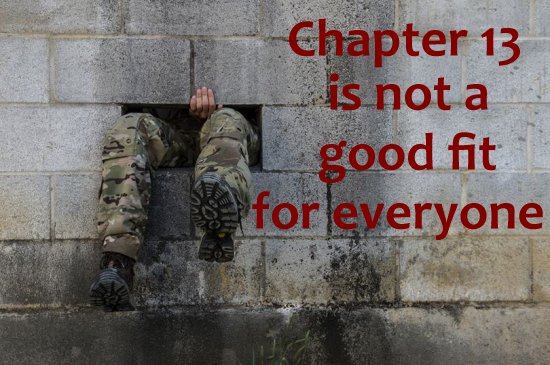The Midwestern Bankruptcy Institute conducted a study on Chapter 13 bankruptcies to examine how many filings succeeded, how many didn't make it to completion and what drove either the success or failure to make it all the way through. According to data in the study, one in three Chapter 13 bankruptcy filings makes it all the way to discharge. But even knowing that two-thirds of debtors don't complete the process doesn't necessarily mean that those filings didn't meet the debtor's financial needs. They may have served their purpose without completion, so it's not fair to label them failures.
The study was conducted by Harvard Law Professor Katherine Porter and she decided to dig in and examine why Chapter 13s didn't reach completion and if not, whether they were in fact a “failure” or a “success.” Here are some of Porter's findings:
#1 For some, plan payments weren't affordable. Chapter 13 repayment plans are financially strict, but they are doable for many debtors that are willing to commit to three to five years on a tight budget in order to keep their home or accomplish some other goal.
#2 For most, it was a change in financial circumstances that made what started out as an affordable repayment plan become unaffordable at some point in the process either due to a loss of unemployment, medical crisis, lessened income or increased expenses.
#3 For about 30% of debtors that had their cases dismissed without discharge, they still saw their Chapter 13 experience as positive because they were able to pay off some debts, buy time to make other arrangements or negotiate with creditors to restructure their debt.
#4 Another percentage of debtors felt their goals were accomplished without receiving a discharge because they were able to negotiate direct repayment plans with their creditors after suspending their Chapter 13.
#5 A significant factor in debtor experience with their Chapter 13 was associated with their choice of attorney. Those that had a good relationship with their attorney and experienced open communication reported a better outcome and process.
#6 There were three recurring recommendations that Chapter 13 filers had for those in debt – to go ahead and file sooner rather than later before things got worse, to try and work things out with your creditors instead of filing Chapter 13 or to go ahead and opt for Chapter 7 and get rid of as many debts as possible rather than taking the longer road of Chapter 13.
The study was conducted by Harvard Law Professor Katherine Porter and she decided to dig in and examine why Chapter 13s didn't reach completion and if not, whether they were in fact a “failure” or a “success.” Here are some of Porter's findings:
#1 For some, plan payments weren't affordable. Chapter 13 repayment plans are financially strict, but they are doable for many debtors that are willing to commit to three to five years on a tight budget in order to keep their home or accomplish some other goal.
#2 For most, it was a change in financial circumstances that made what started out as an affordable repayment plan become unaffordable at some point in the process either due to a loss of unemployment, medical crisis, lessened income or increased expenses.
#3 For about 30% of debtors that had their cases dismissed without discharge, they still saw their Chapter 13 experience as positive because they were able to pay off some debts, buy time to make other arrangements or negotiate with creditors to restructure their debt.
#4 Another percentage of debtors felt their goals were accomplished without receiving a discharge because they were able to negotiate direct repayment plans with their creditors after suspending their Chapter 13.
#5 A significant factor in debtor experience with their Chapter 13 was associated with their choice of attorney. Those that had a good relationship with their attorney and experienced open communication reported a better outcome and process.
#6 There were three recurring recommendations that Chapter 13 filers had for those in debt – to go ahead and file sooner rather than later before things got worse, to try and work things out with your creditors instead of filing Chapter 13 or to go ahead and opt for Chapter 7 and get rid of as many debts as possible rather than taking the longer road of Chapter 13.

